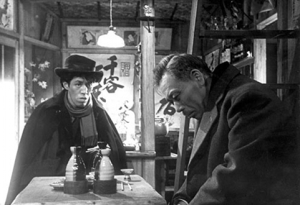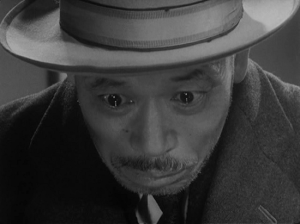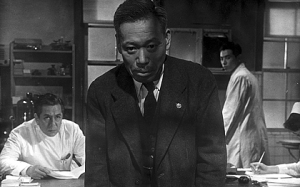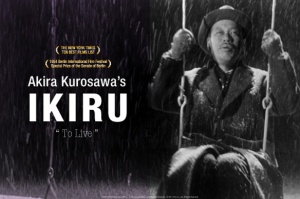What would you do if your doctor said you only had six months left to live? Would you spend it with family and friends? How about doing everything you’ve always wanted to do, but never could? Or would you attempt one last meaningful act that others would remember you for?
This is the dilemma for Kanji Watanabe, the middle-aged protagonist of the 1952 Japanese film "Ikiru." It is also the driving force behind why "Ikiru" is a film everyone should watch at some point in their lives.
In Post-World War II Japan, Kanji Watanabe is the head bureaucrat of Tokyo City Hall. His job entails sending the same cases back and forth through other offices that ultimately come back to him. Nothing ever gets done. Watanabe has held this position for 30 years, and has never missed a day.
"He just drifts through life," the narrator describes. "In fact, he’s barely alive."
After a few days of stomach pains, Watanabe visits his doctor, only to find out he has gastric cancer and has roughly six months to live.

Watanabe, not sure what to do with his life, drifts aimlessly through the city. His impending demise only serves to remind Watanabe that he’s done nothing with his life. No worthwhile memories or achievements. Nobody to remember him for who he really was. Even his only son thinks of him as a source of money, rather than someone with emotions and feelings.
"I just can’t die," said Watanabe. "I don’t know what I’ve been living for all these years."
Watanabe has thousands of dollars saved up for "something special" and wants to have a good time, but has no idea how to spend it.
He runs into a novelist at a bar, who takes Watanabe to Tokyo’s Red Light District, in the hopes of finding happiness. They go to pachinko bars, dance clubs, a strip show and even hook up with a few ladies of the night. By the end, Watanabe still feels empty and without purpose.
While the two take a rest at a piano bar, where everyone else dances merrily, the piano player asks for any requests. Watanabe asks if he knows "Life Is Brief." While initially confused, the player remembers it as an old love song from the 1920s. The song starts out cheerfully and upbeat, until Watanabe sings along to the tune of finding someone to love and never letting go. To make one's life matter before it is gone. All Watanabe can do is cry as he learns that song is about him.
It isn’t until Watanabe is found by a young female coworker that things change. He’s happy around her, because of her optimism on life. She wants to leave the bureaucrat business to work for a toy company, because knowing the toys she makes put smiles on children’s faces gives her purpose.
She tells Watanabe, "Why don’t you try making something too?"

Suddenly, there’s a flicker of light in his eye. A smile comes across his face. "It’s not too late," says Watanabe, as he rushes out of the restaurant to pursue one last meaningful act before he dies. As he walks out, a party from nearby begin to sing "Happy Birthday" for the girl walking up the stairs, but we know that song is being sung for Watanabe and his rebirth.
"Ikiru" is directed by Japanese filmmaker Akira Kurosawa, who also directed "Rashomon" (1950), and the influential films "Seven Samurai" (1954) and "The Hidden Fortress" (1958). While "Ikiru" does not contain a samurai, the film’s message and meaning are just as powerful today as they were in 1952.
We all strive to have purpose in our lives, and to ultimately be remembered long after we have departed this world. That our actions can be seen by others decades after we have turned to dust, and for those people to picture someone whose life meant something.
There is a point in all of our lives where we feel like all that is being accomplished is surviving from one day to the next. That we are merely drifting through life. Like Watanabe, we don't notice that the path we've taken until it already too late.
"How tragic that man can never realize how beautiful life is until he is face to face with death," says the novelist.
The emotional core of "Ikiru" lies here, and its something that I believe everyone on the face of the earth can relate to and understand. No matter your ethnicity, age or gender, there is something in "Ikiru" for everyone to latch onto. We are all like Kanji Watanabe. We seek meaning and fulfillment.
We fear death and what it will bring about. We strive to make our lives matter.

The tragedy and triumph come from the title "Ikiru," which translates as "To Live." Death isn't a massive deal to Watanabe, but realizing that his life has meant nothing is the what gets him. He has only been surviving, instead of living. As he goes to bed the night after finding out about his cancer, he looks up at his certificate of 25 years without missing one day of work, he silently weeps, knowing nothing good has come out of that job.
"Ikiru" is the quiet classic from Kurosawa that proves he was an unparalleled filmmaker that didn't always need sprawling epics and elaborate action sequences to fascinate audiences. Sometimes he merely needed a man's realization that life should never be squandered and a descent into despair, followed by his rebirth. Without even trying, Kurosawa made a film that is universal and timeless, about someone like everybody else.


No comments:
Post a Comment